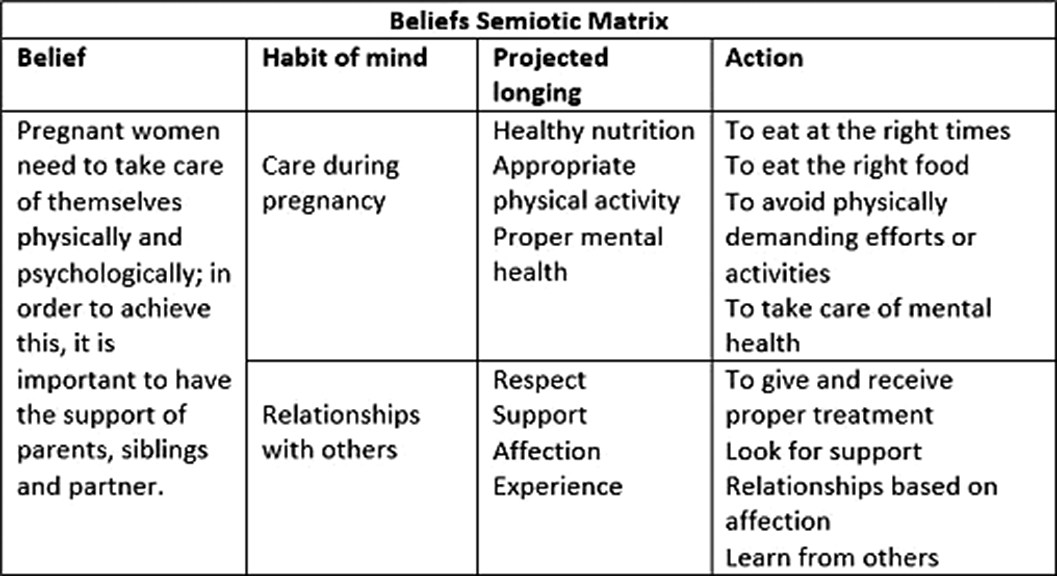No CrossRef data available.
Published online by Cambridge University Press: 19 July 2023
Scientific disciplines recognize that pregnancy not only refers to the biological dimension. It also constitutes a social category, since sociocultural matrices have implications on what is conceived as the state of gestation (Noguera & Rodríguez, 2008). In this sense, cultures develop protocols to guide the actions of pregnant women and their loved ones regarding self-care during pregnancy in order to contribute to the well-being of mother and child (Carmona, Hurtado and Marín 2007). In this context, the belief category becomes relevant as a form of understanding the ways in which we appropriate reality and intervene it (Peirce, 1903).
To analyze the beliefs that a group of pregnant women belonging to a population group from Montería (Córdoba, Colombia) have about taking care of themselves.
Approach: qualitative. The sample was defined by saturation, for a total of 15 pregnant women affiliated to the Mocarí Hospital in the city of Montería, Córdoba. Instrument: semi-structured open interview; content analysis technique through AtlasTi. Emerging categories: a) care during pregnancy; b) relationships with others.
Main belief: Pregnant women need to take care of themselves physically and psychologically, for which it is necessary to have parents, siblings and partner’s support. Care is based on healthy nutrition, physical activity and mental health prevention. It is assumed that self-care is important for the well-being of mother and child. The importance of the family support networks’ participation is also recognized.
Image:

According to the approaches stated/developed by Peirce (1903), beliefs have implications on the way we behave and intervene in reality. Mental habits function as a link between belief and concrete action. For this research, the beliefs that arise from the sociocultural matrices of the pregnant women are evidenced in their concrete actions.
None Declared
To send this article to your Kindle, first ensure no-reply@cambridge.org is added to your Approved Personal Document E-mail List under your Personal Document Settings on the Manage Your Content and Devices page of your Amazon account. Then enter the ‘name’ part of your Kindle email address below. Find out more about sending to your Kindle. Find out more about saving to your Kindle.
Note you can select to save to either the @free.kindle.com or @kindle.com variations. ‘@free.kindle.com’ emails are free but can only be saved to your device when it is connected to wi-fi. ‘@kindle.com’ emails can be delivered even when you are not connected to wi-fi, but note that service fees apply.
Find out more about the Kindle Personal Document Service.
To save this article to your Dropbox account, please select one or more formats and confirm that you agree to abide by our usage policies. If this is the first time you used this feature, you will be asked to authorise Cambridge Core to connect with your Dropbox account. Find out more about saving content to Dropbox.
To save this article to your Google Drive account, please select one or more formats and confirm that you agree to abide by our usage policies. If this is the first time you used this feature, you will be asked to authorise Cambridge Core to connect with your Google Drive account. Find out more about saving content to Google Drive.
Comments
No Comments have been published for this article.